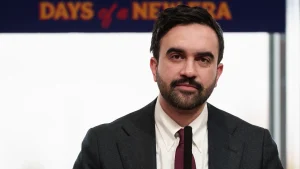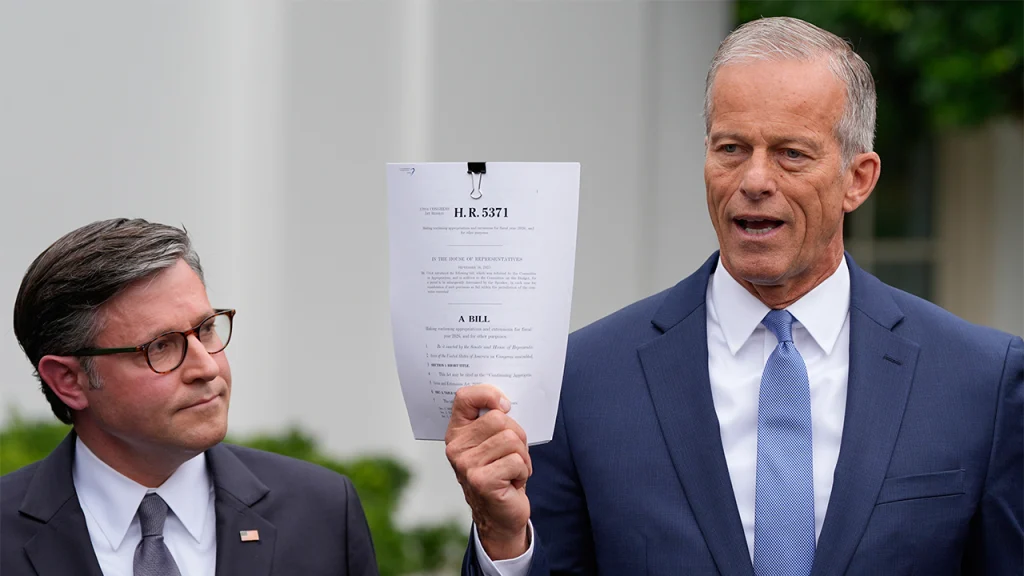Senate Gridlock: Government Shutdown Looms as Partisan Divide Deepens
As the clock ticks down toward a government shutdown, tensions are reaching a boiling point in the Senate. Republican Majority Leader John Thune of South Dakota has publicly criticized Senate Democrats for blocking the GOP’s short-term funding extension for the second time. With just hours remaining before the deadline to fund the government for fiscal year 2025, the likelihood of reaching an agreement seems increasingly remote. Senator Thune expressed frustration at the impasse, stating that Republicans didn’t ask Democrats “to swallow any new Republican policies” or add “partisan riders,” but simply requested an extension of existing funding levels until November 21. This extension would have allowed the Senate to continue what Thune described as “bipartisan appropriations work” already underway. Instead, he claims Senate Democrats rejected the proposal because “far left interest groups and far left Democrat members wanted a showdown with the president,” effectively “sacrificing the American people to Democrats’ partisan interests.”
The current funding crisis represents a familiar pattern in Washington, where temporary funding measures known as continuing resolutions (CRs) have become the norm rather than the exception. The Republican proposal aimed to extend government operations through late November, giving lawmakers additional time to pass the twelve individual spending bills needed to fully fund the government—a comprehensive budgeting process that hasn’t been successfully completed since the 1990s. Despite the approaching shutdown, Senate Republicans found a silver lining in the most recent vote: more Democrats crossed party lines than during the previous attempt earlier in the month. Senate Majority Whip John Barrasso of Wyoming highlighted this shift, noting, “The cracks in the Democrats are already showing. When we had a vote on our proposal to keep the government open, the clean CR right before the recess, we had one Democrat vote. Tonight we had three.” Those crossing party lines included Senators John Fetterman of Pennsylvania, Catherine Cortez Masto of Nevada, and Angus King, an Independent from Maine who typically caucuses with Democrats.
The Democratic position, led by Senate Minority Leader Chuck Schumer of New York, remains firm as the shutdown deadline approaches. Rather than accepting responsibility for the standoff, Schumer redirected blame toward Republicans and President Trump for “plunging America into a shutdown, rejecting bipartisan talks, pushing a partisan bill, and risking America’s health care.” A key point of contention centers on Democrats’ push to include extensions of expiring Obamacare tax credits in the funding package—provisions Republicans argue don’t belong in a short-term funding bill. Despite the disagreement, Schumer maintained that the responsibility lies with Thune and Republicans to engage in negotiations. “We hope they sit down with us and talk,” Schumer stated. “Otherwise, it’s the Republicans who will be driving us straight towards a shutdown tonight, and at midnight. And the American people will blame them for bringing the federal government to a halt.”
The standoff highlights the increasingly partisan nature of what was once routine government business. Passing continuing resolutions to keep government operations running has traditionally been viewed as basic governance rather than an opportunity for political brinksmanship. However, in today’s polarized political environment, even temporary funding measures become battlegrounds for larger policy disputes. Republicans insist they’ve offered a “clean” extension without controversial additions, while Democrats argue that critical healthcare subsidies should be preserved as part of any agreement. Neither side appears willing to compromise with the deadline looming, creating uncertainty for federal workers and government services across the nation. The immediate impact will be felt by hundreds of thousands of federal employees who face furloughs or working without immediate pay, while various government services from national parks to certain regulatory functions will be suspended or significantly curtailed.
This governmental impasse occurs against the backdrop of a contentious election season, raising questions about whether political positioning is taking precedence over functional governance. Senate Majority Leader Thune’s suggestion that Democrats who are “very unhappy with the situation” know where to find him if they want to talk indicates a standoff mentality rather than active negotiation. Similarly, Schumer’s insistence that Republicans must “sit down with us and talk” places the onus for compromise on the majority party. The partisan rhetoric from both sides—with Republicans accusing Democrats of bowing to “far left interest groups” and Democrats claiming Republicans are “risking America’s health care”—further entrenches positions and makes compromise more difficult. This shutdown threat becomes particularly significant as it represents the first major funding crisis under the new Republican Senate majority, setting a concerning precedent for governance in the coming years.
As the midnight deadline approaches, the practical consequences of political gridlock come into sharper focus. A government shutdown doesn’t just represent a political failure—it creates real hardships for Americans who depend on government services and for federal workers who face financial uncertainty. While essential functions like national security operations and Social Security payments will continue, many other services will be disrupted. The economic impact extends beyond government employees to contractors, businesses that serve federal workers, and potentially the broader economy if the shutdown persists. Perhaps most concerning is the normalization of governance-by-crisis, where basic funding decisions become leverage points for partisan battles rather than routine acts of responsible governance. Whether last-minute negotiations might yet prevent a shutdown remains uncertain, but what’s clear is that the political divide in Washington continues to complicate even the most fundamental functions of government, leaving Americans to bear the consequences of congressional dysfunction.















